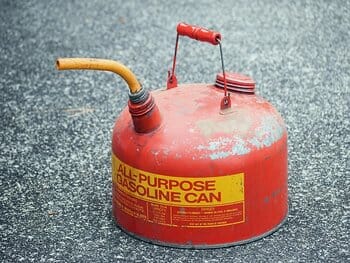
Gasoline engines have been with us for over a century, so it’s not unusual to keep a can of gas around for lawn mowers and other items we need to take care of our properties. Your gas can could be metal, or it could be plastic—both types are in use. Gas cans are so commonplace that you might not realize that they can be dangerous, especially the plastic type. Simply pouring gas from the can under certain conditions can create an explosive fire. From 1998 through 2015, more than 1,200 visits to the ER and at least 11 deaths were due to explosions that occurred while pouring gasoline out of a plastic can.
Flame Arrestors: An Ignored Solution
Any gas can, when stored or handled improperly, can burst and cause an explosion and fire; but plastic gas cans have special dangers metal ones do not that arise from static electricity. Plastic rubbing on plastic (such as your truck bed’s liner) or on carpeting (such as in the trunk of your car) easily creates the right conditions for a static electricity spark. When the volatile gasoline vapors inside the can combine with the static electricity spark, the resulting flame can travel back down the can’s nozzle to make the can explode, causing catastrophic burn injuries. If you’ve suffered such an injury, a Baltimore burn injury attorney can provide legal assistance. A piece of the can that costs about fifty cents would prevent calamitous explosions; that piece is called a flame arrestor. It’s been proven that flame arrestors prevent gas cans from exploding.
The problem of gas cans lacking flame arrestors and the resulting explosions goes back to 1973 and Consumer Report’s lobbying for their inclusion in cans. More recently, the Bureau of Alcohol, Tobacco, and Firearms (ATF) tested gas cans in 2010 for the phenomenon known as “jetting.” A gasoline-diesel mix inside a can generated a flame that extended as far as 13 feet from the gas can’s mouth. Ignited liquid from the can could hit a person more than four feet away. In such a scenario, severe, perhaps fatal, burns would result.
Due to a number of tragic outcomes involving gas can explosions, Congress created the Portable Fuel Container Safety Act of 2017. The Act would mandate that the Consumer Product Safety Commission (CPSC) put forth a final rule for “flame mitigation devices,” the best known of these being flame arrestors. The bill is currently in a subcommittee for study.
The Defective Product Suits
More gas can manufacturers are now making their cans with flame arrestors in them. Many metal cans have had flame arrestors for years, and these days a number of plastic cans do as well. However, not all can manufacturers include them, and many older gas cans without flame arrestors are still in use and causing injuries. Clearly, a gas can which lacks a flame arrestor that could prevent horrific injuries should be considered a defective product.
A number of defective product lawsuits for devastating burn injuries are underway, naming retailers such as Wal-Mart along with gas can manufacturers and suppliers Wedco, Scepter, Midwest, and Blitz USA. The harm that was done to injured consumers happened when they used the gas cans properly and as recommended, under normal circumstances. Approximately 80 suits were filed between 2004 and 2010; that number is undoubtedly higher now. Supplier Blitz USA has declared bankruptcy because of the defective product suits arising from gas cans without flame arrestors.
The pain and suffering from a catastrophic burn injury cannot be imagined, and the costs to treat the injury are often ruinous. It only makes sense that whoever is responsible for the defective product that caused life-shattering burns should pay the costs. If you or a loved one has suffered severe injuries from a gas can explosion or other defective product, you need the caring support of a skilled attorney.
We’re Listening. Tell Us What Happened.
There’s no excuse for injury and death due to dangerous and defective products. If you or a family member has suffered from a defective product injury, contact The Law Offices of Steven H. Heisler. Keep in mind, however, that there is a statute of limitations – or a time limit – for filing personal injury claims, so you should not delay. Contact us for a free initial consultation by calling 1-410-625-4878, or by using our confidential online form.
